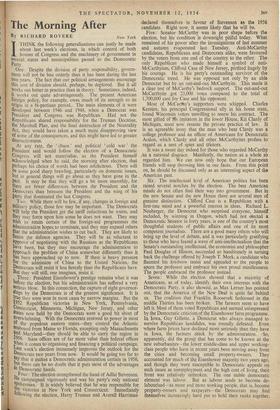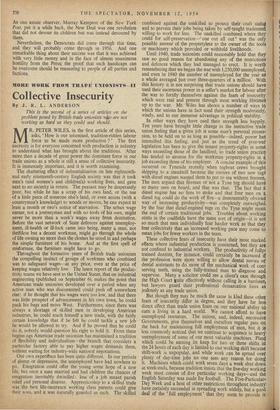The Morning After
ny RICHARD ROVERE New York ITHINK the following generalisations can justly be made about last week's elections, in which control of both houses of Congress and the machinery of government in several states and municipalities passed to the Democratic Party. One: Despite the division of party responsibility, govern- ment will not be less orderly than it has been during the last two years. The fact that our political arrangements encourage this sort Of division should, perhaps, be deplored. But it all Works out better in practice than in theory. Sometimes, indeed, It works out quite advantageously. The present American foreign policy, for example, owes much of its strength to its origin in a bi-partisan period., The main elements of it were developed between 1946 and 1948, when a Democrat was President and Congress was Republican. Had not the Republicans shared responsibility for the Truman Doctrine, the Marshall Plan, and the final destruction of the Neutrality Act, they would have taken a much more disapproving view of some of the consequences, and this might have led to greater destructiveness.
At any rate, the ' chaos ' and political 'cold war' the President said would follow the election of a Democratic Congress will not materialise, as the President himself acknowledged when he said, the morning after election, that perhaps his choice of words had been infelicitous. There will be sonic good sharp brawling, particularly on domestic issues, but in general things will go about as they have gone in the Past. It may be that they will go a bit more smoothly, for there are fewer differences between the President and the bemocrats than between the President and the wing of his party that dominated the last Congress.
Two: While there will be few, if any, changes in foreign and Military policy, those few may be important. The Democrats Will help the President get the tariff reductions he wants, and they may force upon him some he does not want. They may Wish to retain certain of the foreign-aid programmes the administration hopes/ to terminate, and they may expand others that the administration wishes to cut back. They are likely to fatten the defence agencies. They will be as reluctant to aPprove of negotiating with the Russians as the Republicans ave been, but they may encourage the administration to PProach the problem of China somewhat differently than it as been approached up to now. If there is heavy pressure for the admission of China to the United Nations,' the bernocrats will resist it less fiercely than the Republicans have. but they will still, one imagines, resist it. Three : President Eisenhower's prestige remains what it was before the election, but his administration has suffered a very Serious blow. In this connection, the capture of eight governor- Ships by the Democrats is of the greatest significance. It is true they were won in most cases by narrow margins. But the t.0952 Republican victories in New York, Pennsylvania, i nnecticut, Minnesota, Michigan, New Jersey, and other states now held by the Democrats were a good bit short of Overwhelming. With the Democrats restored to power in most CIf the populous eastern states—they control the Atlantic Seaboard from Maine to Florida, excepting only Massachusetts 11,nd Maryland—they should be able to carry the region in 4956. State offices are of far more value than federal offices IVhen it comes to-organising and financing a political campaign. La, st week's election immensely improves the outlook for the usmocrats two years from now. It would be going too far to tilIfY that it makes a Democratic administration certain in 1956, ) , ut there can be no doubt that it puts most of the advantages In Democratic hands.
,Four: The election strengthened the hand of Adlai Stevenson. Ile campaigned vigorously and was his party's only national spokesman. It is widely believed that he was responsible for Ino victories in New York and Connecticut. Immediately following the election, Harry Truman and Averell Harriman .declared themselves in favour of Stevenson as the 1956 candidate. Right now, it seems likely that he will be. Five: Senator McCarthy was in poor shape before the election, but his condition is downright pitiful today. What remained of his power after the investigations of last summer and autumn evaporated last Tuesday. Anti-McCarthy candidates, Republicans and Democrats alike, were favoured by the voters from one end of the country to the other. The only Republican who made himself a symbol of anti- McCarthyism, Clifford Case of New Jersey, profited hugely by his courage. He is his party's outstanding survivor of the Democratic trend. He was opposed not only by an able Democrat but by an out-and-out McCarthyite. This made it a clear test of McCarthy's bedrock support. The out-and-out McCarthyite got 23,000 votes compared to the total of 1,700,000 cast for Case and his opponent.
Most of McCartlly's supporters were whipped. Charles Kersten, his principal Congressional ally in his home state, found Wisconsin voters unwilling to renew his contract. The most gifted of Ms imitators in the lower House, Kit Clardy of Michigan, must now resume the private practice of law. It is an agreeable irony that the man who beat Clardy was a college professor and an officer of Americans for Democratic Action, which Clardy and all other McCarthyites profess to regard as a nest of spies and traitors.
It was a sweet day indeed for those who regarded McCarthy Jas a national disgrace. Manifestly, the nation as a whole p regarded him. We can now only hope that our European friends will stop throwing him in our faces. From this point on, he should be discussed only as an interesting aspect of the American past.
Six : The intellectual level of American politics has been raised several notches by the election. The best American minds do not often find their way into government. But in the new Senate and the new House there are several men of genuine distinction. Clifford Case is a Republican with a first-rate mind and a powerful interest in ideas. Richard L. Neuberger, the Democrat who surprised everyone, himself included, by winning in Oregon, which had not elected a Democratic Senator in forty years, is one of the country's most thoughtful students of public affairs and one of its most competent journalists. There are a good many others who will bring up the level of debate, and it was particularly gratifying to those who have feared a wave of anti-intellectualism that the Senate's outstanding intellectual, the economist and philosopher Paul Douglas of Illinois, succeeded so handgOmely in turning back the challenge offered by Joseph T. Meek, a candidate who flaunted his lowbrow tastes and appealed to the people to spurn the professor and embrace his own proud mindlessness. The people embraced the professor instead.
Seven: While the election showed that a majority of Americans, as of today, identify their own interests with the Democratic Party, it also showed, as Max Lerner has pointed out, that the America of the New Deal is quite far behind us. The coalition that Franklin Roosevelt fashioned in the middle Thirties has been broken. The farmers seem to have left it. Most of them voted Republican and seemed unimpressed by the Democratic criticism of the Eisenhower farm programme. In Iowa, Guy Gillette, a Democrat who always managed to survive Republican landslides, was roundly defeated. Even 'where farm prices have declined more seriously than they have in Iowa, the farmers stuck by the administration. 'So, apparently, did the group that has come to be known as the new suburbanites—the lower middle-class and upper working- class people who have in recent years been moving away from the cities and becoming small property-owners. They accounted for much of the Eisenhower majority two years ago, and though they 'were susceptible to Democratic appeals on such issues as unemployment and the high cost of living, their front was relatively unbroken. The one stable democratic element was labour. But as labour tends to become de- labourised—as more and more working people, that is, become property-owners and taxpayers—the Democrats may find themselves. increasingly hard put to hold their ranks together. As one astute observer. Murray Kempton of the New York Post, put it a while back, the New Deal was one revolution that did not devour its children but was instead devoured by them.
Nevertheless, the Democrats did conic through this time, and they will probably come through in 1956. And one remarkable thing about their success was that it was achieved with very little money and in the face of almost unanimous hostility from the Press: the proof that such handicaps can be overcome should be reassuring to people of all parties and factions.



































 Previous page
Previous page